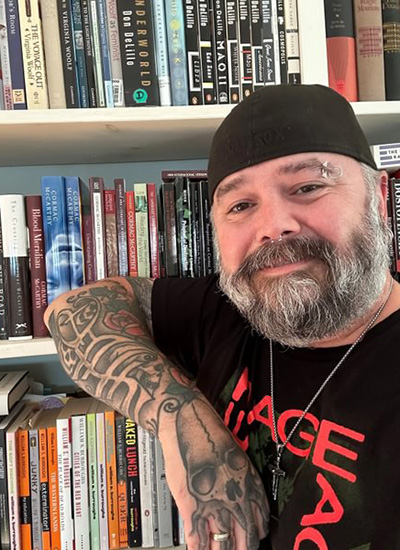
Today’s faculty spotlight features Interdisciplinary Studies Chair Vernon Cisney. Cisney came to Gettysburg in 2012 following the completion of his doctoral work at Purdue University. He did his undergraduate work at Lake Land College and Eastern Illinois University before pursuing a master’s degree in philosophy at the University of Memphis.
Cisney serves as chair and associate professor of Interdisciplinary Studies, along with being a member of Jewish Studies and contributing to both Philosophy and Cinema and Media Studies. His teaching style includes an interactive and discussion-based approach focused on developing student opinions and understanding. According to Cisney, his approach to learning “is designed to facilitate their own adoption of responsibility for their humanity, both intellectually and emotionally.” His passion for education has earned him the Ralph Cavaliere Endowed Teaching Award and the Berg-Myers Award for Teaching Excellence in Jewish Studies.

One of Cisney’s favorite aspects of teaching is conducting research with students. He feels it’s a two-way street where faculty gain knowledge and insight to empower their own academic pursuits, while students acquire valuable mentorship and skills like collaboration and adaptability to aid their development as thinkers and researchers. This past summer, Cisney teamed up with Kolbe Fellow Ryder Hobbs ’25 to explore how the contemporary political climate can be viewed through the lens of 20th century French philosophy.
Away from campus, Cisney enjoys singing and playing guitar, working on crossword puzzles, and hanging out with his daughter and dog. This fall, he will be teaching two First-Year Seminars. The first, titled Plato, Personhood, and Popcorn: Big Ideas on the Big Screen, explores ways of thinking about personal identity and human nature through philosophical, religious, and cinematic texts. Cisney’s second seminar is called The Philosophy of Monsters and investigates an assortment of philosophical and pop cultural understandings of monstrosity and how it reflects and reveals the nature of humanity.
In both offerings, the curriculum encourages students to dive deeper into works of entertainment to explore the bigger meaning behind images and narratives, laying the groundwork for their own exploration and interpretation of the world we live in.
“This ultimately demonstrates to students that philosophical engagement is not confined to dusty old books written by deceased European scholars, but that it is everywhere, in everything, all around them, and that entertainment need not be merely passive consumption, but can provoke deep reflection on the world around you,” Cisney said. “This, to me, is a perfect synecdoche of the sort of highly integrated, interdisciplinary and world-oriented education that students will get in their four years at Gettysburg.”
By Corey Jewart
Photos by Jason Minick, Vernon Cisney
Posted: 08/20/24